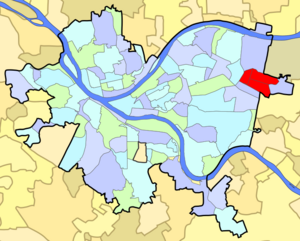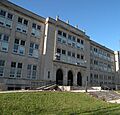Homewood (Pittsburgh) facts for kids
Quick facts for kids
Homewood
|
|
|---|---|
|
Neighborhood of Pittsburgh
|
|
 |
|
| Country | United States |
| State | Pennsylvania |
| County | Allegheny County |
| City | Pittsburgh |
| Area | |
| • Total | 1.03 sq mi (2.7 km2) |
| Population
(2010)
|
|
| • Total | 6,442 |
| • Density | 6,254/sq mi (2,415/km2) |
Homewood is a neighborhood in Pittsburgh, Pennsylvania, United States. It's mostly home to African-American residents. Homewood is actually split into three smaller neighborhoods: Homewood North, Homewood South, and Homewood West.
This area is bordered by the Martin Luther King Jr. East Busway, which is a special road for buses. This busway follows an old train line that goes towards downtown Pittsburgh.
Contents
Where is Homewood?
Homewood is located in the eastern part of Pittsburgh. Some of its northern and eastern edges touch Penn Hills Township. Inside Pittsburgh, Homewood shares borders with other neighborhoods:
- To the east, it's next to East Hills.
- To the west, it's near Larimer.
- To the north, you'll find Lincoln-Lemington Belmar.
- To the south, it borders North Point Breeze.
A Look at Homewood's Past
Homewood was started in 1832 by a judge named William Wilkins. The first black residents moved into this quiet area after the American Civil War.
Pittsburgh officially added Homewood to the city on December 1, 1884. Back then, it was mostly made up of large estates for rich families. Famous business leaders like Andrew Carnegie and Thomas M. Carnegie even lived there until the late 1880s.
Starting in the 1910s, more people began moving to Homewood. These included families from Ireland, Italy, Germany, and also many middle-class black families. They moved there because housing was affordable. This made Homewood a more diverse place. At first, white and black residents got along well. But over time, tensions between different groups grew.
In the 1950s, the city needed land in another area, the Lower Hill District, to build the Civic Arena. This project meant that about 8,000 people had to move from their homes. Most of these people were less wealthy black residents who then found new rental apartments in Homewood. This sudden move caused a big change in the number of black residents compared to white residents in the area.
Because of this, many white middle-class families moved away from Homewood. The population changed from 22% black in 1950 to 66% black in 1960. Since the area became mostly African-American, it was greatly affected by the assassination of Dr. Martin Luther King Jr. in 1968. This sad event led to a period of unrest in Homewood, which caused a lot of damage to local businesses and hurt the shopping area.
In the 1970s and early 1980s, Homewood faced challenges with increased crime. However, the Homewood-Brushton Revitalization and Development Corporation worked hard to rebuild the area. They helped by building new homes and supporting new businesses.
Who Lives in Homewood?
Demographics means studying the people who live in a place, like their age, race, or how many there are. According to the 2010 Census, most people in Homewood are African American (97.8%). There are also smaller groups of White people (1.2%), American Indian people (0.3%), and Asian people (0.15%).
Homewood's Neighborhoods
Homewood is officially split into three smaller neighborhoods:
- Homewood North is located in the eastern part of Pittsburgh. It has two ZIP Codes: 15221 and 15208.
- Homewood South is also in the eastern part of Pittsburgh. Its ZIP Codes are 15208 and 15221.
- Homewood West is another neighborhood in eastern Pittsburgh. Its ZIP Codes are 15206 and 15208.
- Two famous people from Homewood West are:
- Charles 'Teenie' Harris, a well-known photographer.
- Mary Cardwell Dawson, who started the National Negro Opera Company.
- Two famous people from Homewood West are:
Learning in Homewood
Homewood is part of the Pittsburgh Public Schools district. Students can attend neighborhood schools or special magnet schools. The public schools in the area include:
- Pittsburgh Lincoln School (for grades K-5)
- Pittsburgh Faison School (for grades K-5)
- Westinghouse High School (for grades 6-12)
For higher education, there's the Community College of Allegheny County's Homewood Brushton Center.
Jobs in Homewood
The number of people without jobs in Homewood is higher than in most other parts of Pittsburgh. This means that the average income per person and the average household income in Homewood are lower than both the Pittsburgh and Pennsylvania averages. Interestingly, among those who are employed, men generally earn more than women, but there are more employed women than men in Homewood.
Getting Around Homewood
Homewood has its own station, called Homewood station, on the Martin Luther King Jr. East Busway. This makes it easy for people to use public transportation.
City Steps
Homewood has 8 different sets of city steps. These steps are like outdoor staircases that help people walk up and down the hilly areas of Pittsburgh. They connect people to public transportation and make it easier to get around.
Places to Visit
- Afro-American Music Institute
- Carnegie Library
Notable People
- Martell Covington, a politician who represents Pennsylvania in the state government.
Images for kids




